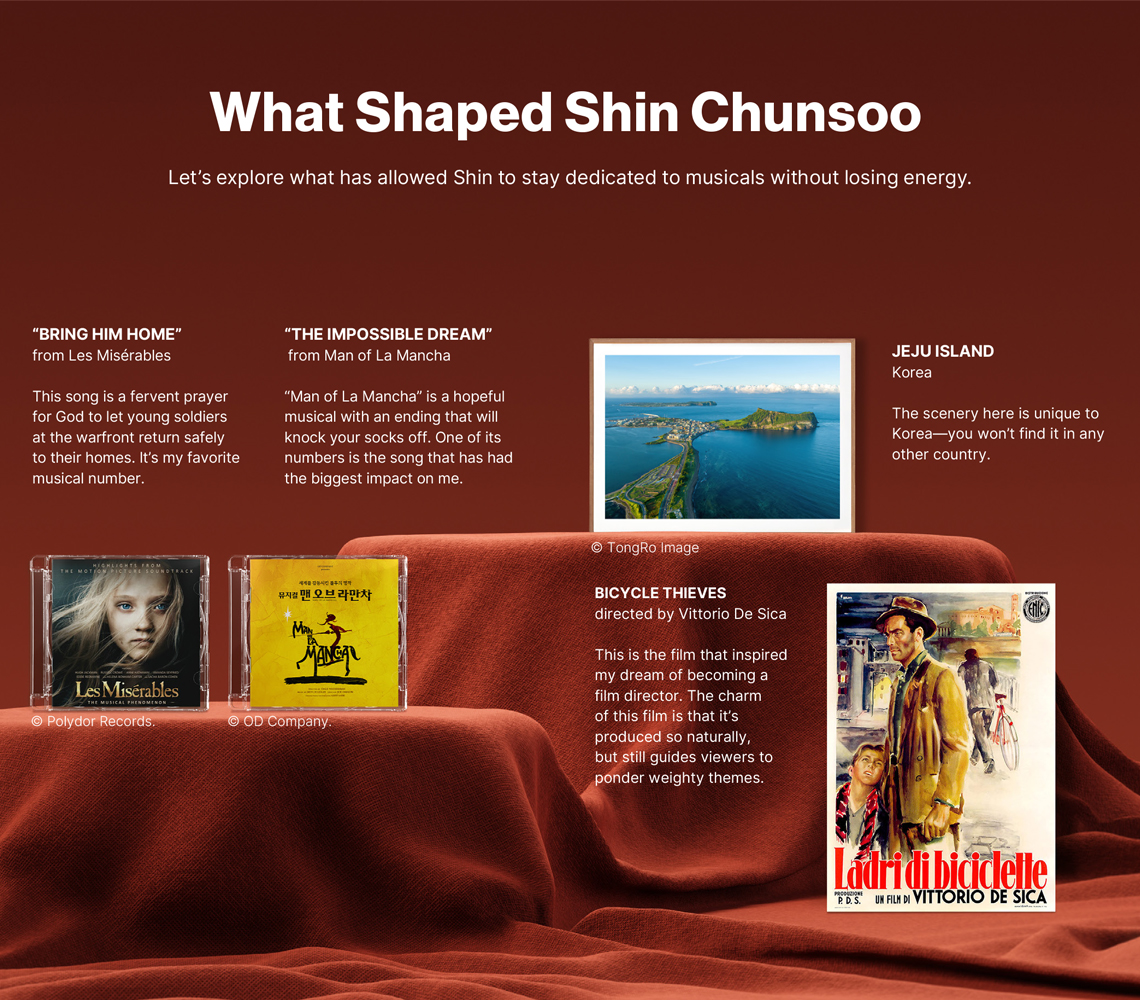In just three months, “The Great Gatsby” has racked up more than USD 21.87 million in ticket sales through 100 showings, boasting a 98% occupancy in its 1,700-seat venue. The musical, which is being held on Broadway, the famed home of the musical, continues to sell out shows. And this sellout musical is produced by Shin Chunsoo, president of Korea’s OD Company. Through the production, Shin has boosted awareness of Korea’s status in the field of musicals. He’s the first Asian to be sole producer of a Broadway musical, as well as the first Asian to win a Tony Award for Best Costume Design. But Shin doesn’t plan to rest on his laurels. He’s already eyeing his next show as he seeks to open doors in the performing arts.
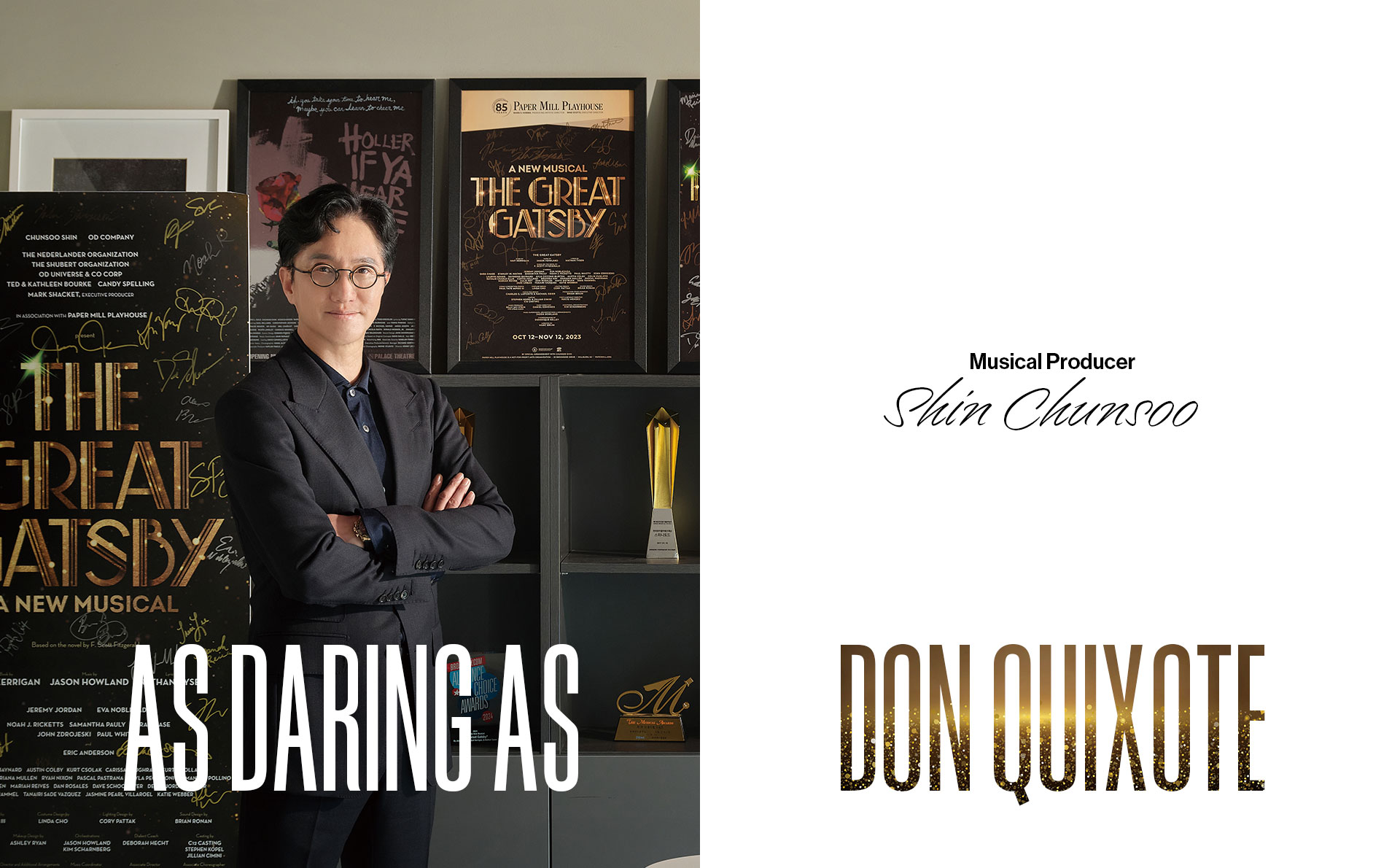
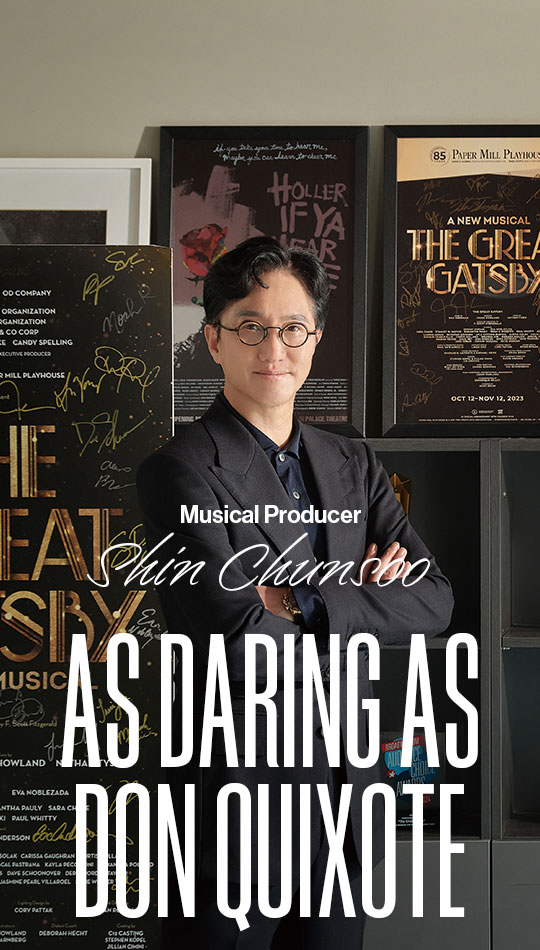
Writer.
Sung Ji Yeon
Photos courtesy of.
OD Company
Open the Door
This is how Shin Chunsoo introduces himself: “What kind of person am I? If I get an idea in the evening, I have to put it into practice the next day. I can’t stand doing otherwise. I also enjoy dealing with all the issues that come up along the way.”
By temperament, Shin has the ability to immediately pour all his energy into whatever intrigues him. Indeed, that has helped him reach his current position. That same tendency was in evidence when Shin first dabbled in musicals. The fact is his lifelong dream was to be a film director. Shin changed majors and started working on film productions when a friend brought him to see a musical.
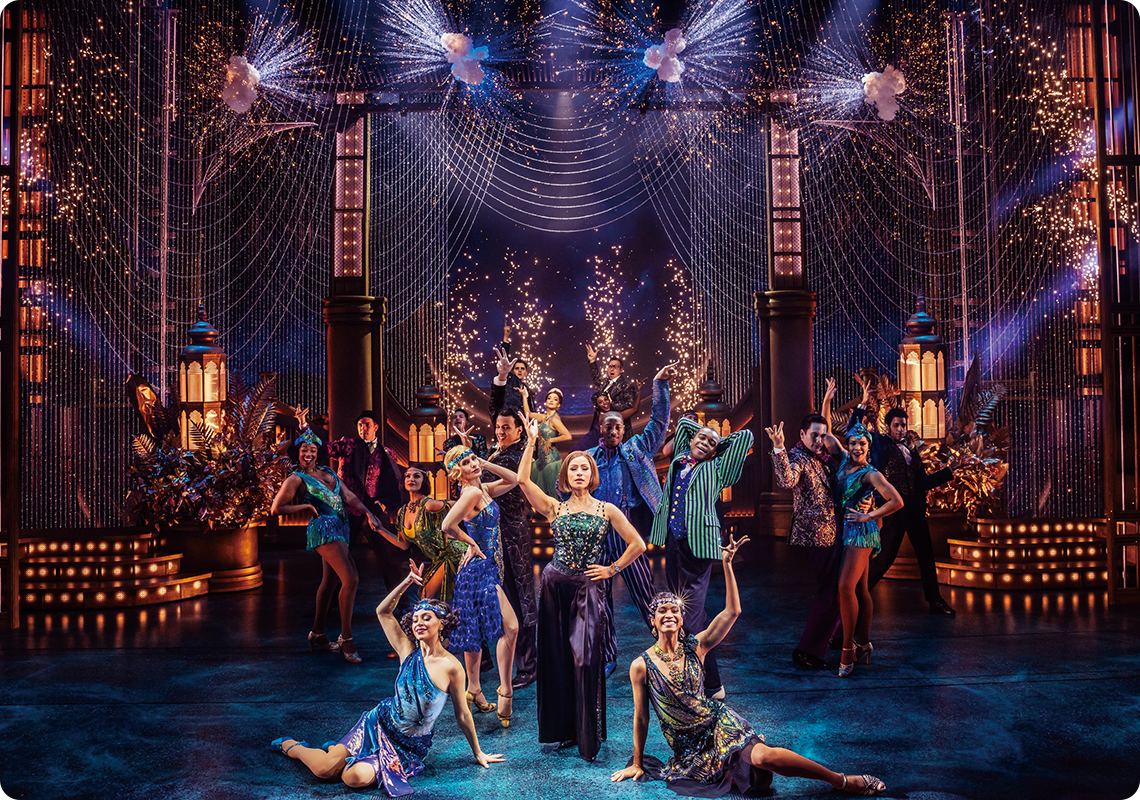 A scene from ‘The Great Gatsby’ led by lead producer Shin Chunsoo
A scene from ‘The Great Gatsby’ led by lead producer Shin Chunsoo
The larger-than-life acting of the cast, the frenetic bustling of the crew, and indeed all the elements of the production were just like a scene from a movie. In a trice, he’d fallen head over heels for musicals, and he jumped in feet first into everything connected to them. He’d do office work in the morning and handle performance operations in the afternoon. Some days he’d be in charge of the stage, and other days he’d check the script.
Having tried his hand at every part of making musicals, from planning to production, he eventually began to dream about being a musical producer. “I wanted to be like Cameron Mackintosh, the world-renowned producer of ‘Les Misérables.’ I was determined to open up a new world of musicals. That’s why I set out on my own by establishing OD Company. The name even means, ‘open the door.’”
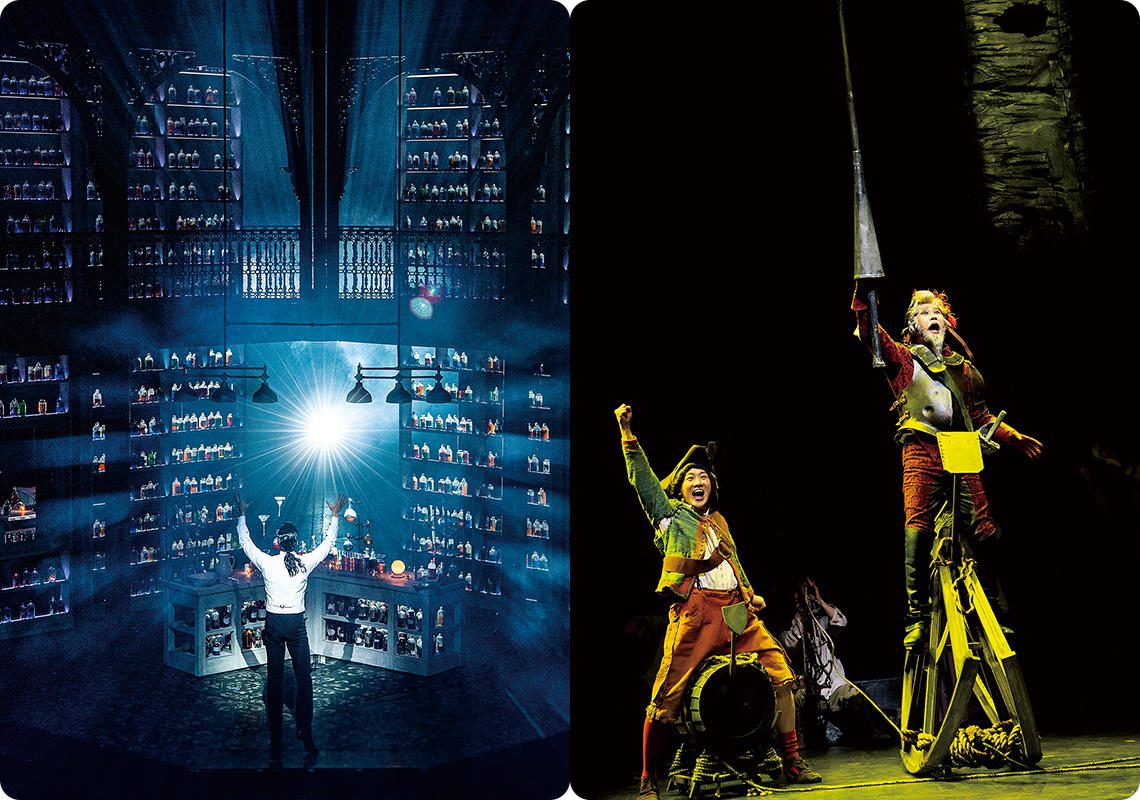 (Left) ‘Jekyll & Hyde,’ first performed in Korea in 2005 and still ongoing today
(Left) ‘Jekyll & Hyde,’ first performed in Korea in 2005 and still ongoing today (Right) The musical ‘Man of La Mancha’ based on the novel ‘Don Quixote’
No Failures, Just Experience
Since establishing OD Company, Shin has made one bold move after another. In 2004, he staged the musical “Jekyll & Hyde,” in the thriller genre―a genre that was nonexistent in Korea at the time. He was also the first Korean producer to introduce double casting, in which two actors take turns playing a single role. For “The Seagull,” he yanked out half the audience seats and dumped 20 tons of water into the venue to form a lake. Unconcerned about success or failure, Shin dismissed protests about his rash ideas and ran forward with them anyway. It was around that time that Shin became associated with Don Quixote in the popular imagination.
After producing several major hits in Korea, Shin swiftly pivoted to Broadway. To have a chance to bring his work to a global audience, he knew he needed recognition on Broadway in New York and West End in London, the cradle of the musical. Shin’s goal from the time he established his company was to reach Broadway, and he saw “Dreamgirls” as a step toward achieving that goal. He shared his vision of making a unique version of “Dreamgirls” in a meeting with the original production team. With the producers’ blessing, he licensed the show and staged it just as he’d envisioned it.
Unfortunately, the show didn’t live up to Shin’s grand vision. He couldn’t achieve his goal of staging “Dreamgirls” on Broadway in 2009. He did help produce “Holler If Ya Hear Me” (2013) and “Doctor Zhivago” (2015) on Broadway stages over the next decade, but they closed early due to poor ticket sales. Nevertheless, Shin remained undeterred by those setbacks, which he viewed as part of the journey toward his goal. “That was a really meaningful time. That’s when I built a network on Broadway and earned people’s trust. Crucially, that also motivated me to ponder what kind of performances people want to see,” he said.
That gave birth to “The Great Gatsby.” Concerns that American critics would be uncharitable to an adaptation of the country’s best-known novel were soon quashed by audiences’ enthusiastic response. Just three weeks into production, “The Great Gatsby” had already topped a million dollars in sales and claimed nine honors in the Theater Fans’ Choice Awards. It also took home a Tony, one of the most prestigious awards in show business. Thanks to the audience’s enthusiastic support, the musical’s run was extended from Nov. 2024 to 2025. The audience praised the show for offering everything they’d wanted from a musical: exceptional performances, captivating musical numbers, stunning stage design and dazzling costumes.
Shin pointed to several reasons for the success of “The Great Gatsby.” The first reason he said, was that there was just one producer―namely, Shin himself. In a musical, the cast needs to receive unmistakable directions, but in previous projects, there had been as many as five separate producers, which only muddied the waters. After those experiences, Shin insisted on being the sole producer, enabling him to clearly direct all members of cast and crew.
The second reason for success, Shin said, was his experience in Korea. The Korean musical industry has enjoyed astounding growth for nearly 20 years now. Compared to the mechanisms of Broadway, Korea’s musical industry is more freewheeling, and less organized. But that very feature enabled Shin to personally experience every aspect of musical production. Thanks to his familiarity with the whole show, he was able to take on full responsibility and make all necessary adjustments as solo producer.
Third, Shin puts a lot of stock in bold investments. All shows bound for Broadway iron out their wrinkles in a series of pre-performances called tryouts. That gives producers a chance to tweak the show’s script, music, stage design and direction based on audience reactions. But the problem is that tryouts don’t produce a single cent of revenue. With that in mind, production companies usually spend around USD 4 million on stage setup and costumes for the tryouts, but Shin spent double that amount. He believed the tryout shouldn’t be a workshop for the show, but should provide the peak experience from the very get-go. He saw that as essential for getting recognized.
The final factor for Shin was trust in his team. “I thought the concept of soiree played a critical role in ‘The Great Gatsby.’ It’s an effective way of conveying the main character’s glitzy background, the century-old period and the psychology of the characters. So I asked our designers to not get hung up on period costumes but to infuse the show with the feeling of a new era coming on. I told them that cost was not an issue, and I also placed complete trust in the cast and crew. I told them if they had a good idea, they should pitch it to me. That helped create enduring trust between the team members, which seems to have generated synergy,” he said.
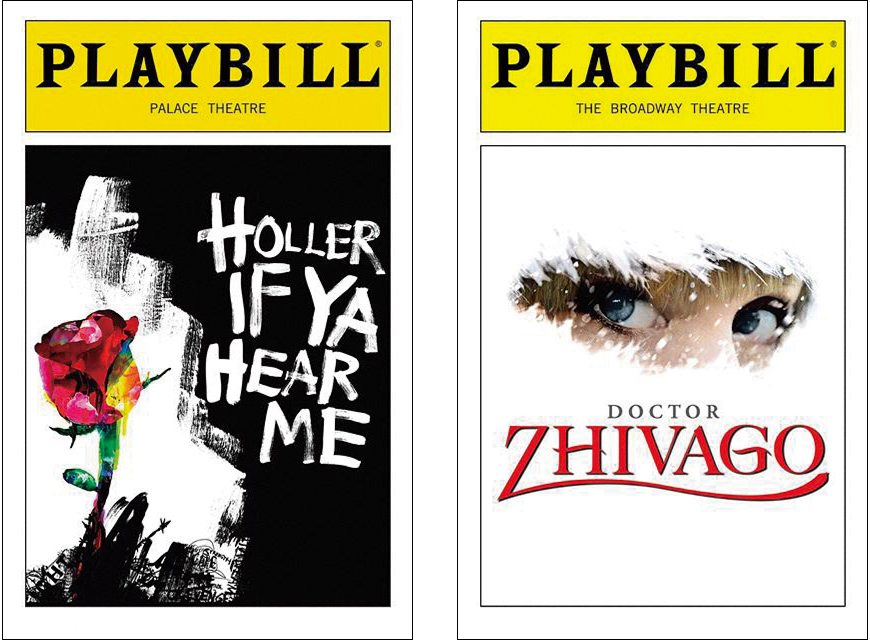 (Left) ‘Doctor Zhivago,’ performed at Broadway Theatre, New York, United States
(Left) ‘Doctor Zhivago,’ performed at Broadway Theatre, New York, United States(Right) ‘Holler If Ya Hear Me,’ staged at Palace Theatre, New York, United States
The Next Show
Despite his brilliant achievements, Shin needs to transcend himself to take the next step. A tall order? Given how far he’s come, Shin doesn’t seem likely to give up on his dreams. Sure enough, when I asked if he was working on anything new, he had a ready answer.
“I’m preparing for the Broadway debut of the show ‘Il Tenore.’ It’s a story about Korea’s first operatic tenor who performed during Japan’s colonial rule of the country. I wanted to recreate the youth’s song of hope from that painful time as a musical. And someday, I want to put on a Korean-language show in the home of musicals. The language barrier is a sticking point in the performing arts, but since this is a story about Korea, I’d like to feature Korean actors speaking the Korean language. I want a show about Korea to have the kind of artistry and universality that will appeal to audiences around the world,” Shin said.
Don’t be afraid to dream. Don’t be afraid of failure. Trust completely. Focus on the next step. Given that attitude, the nickname of Don Quixote seems like a good fit for Shin. But there’s a crucial difference between the two. Unlike the hero of Cervantes’ novel, all of Shin’s seemingly fanciful ventures have come true. That’s reason to believe his future endeavors won’t be passing fancies, but fantastic realities. And you can take that to the bank.
